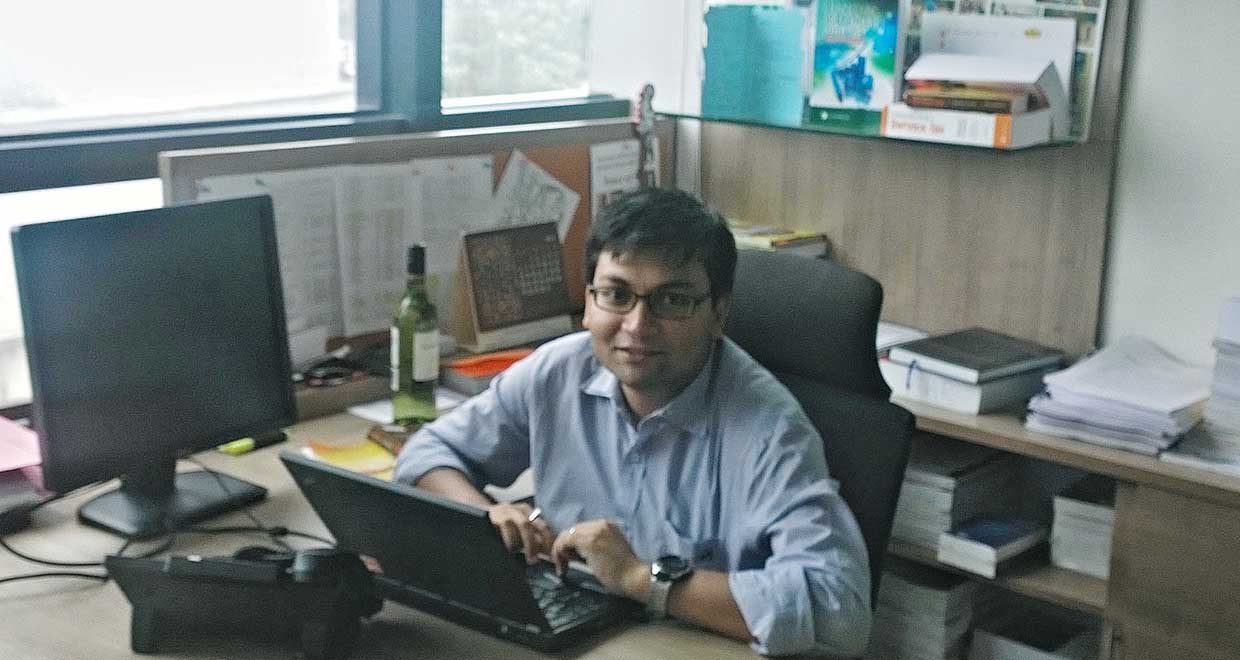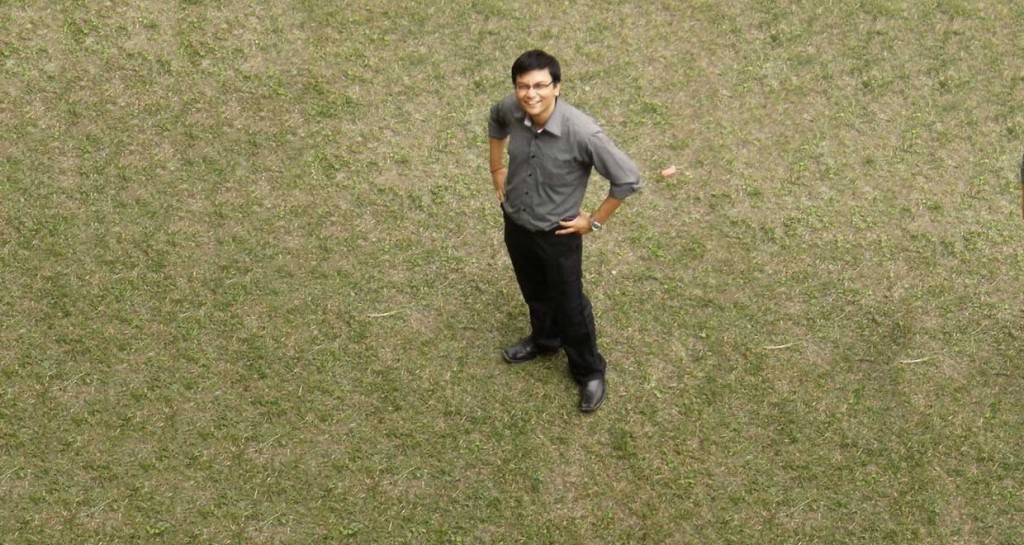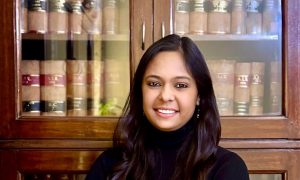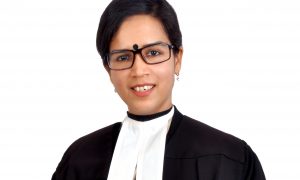Pratyush Saha graduated from WBNUJS in 2011. During law school, he participated in various co-curricular activities and has multiple publications to his name. Soon after graduation, he joined BMR Advisors Pvt. Ltd. as an Associte-Indirect tax. Later he switched to PricewaterhouseCoopers and currently works as an Assistant Manager, Indirect Taxes.
In this interview, he talks about:
- Law school experience at WBNUJS
- Work experience at BMR Advisors
- Induction and work at PwC
- Work experience in tax law
Tell us a bit about your childhood and pre-college life as well as educational background.
As a kid, I was an exceptionally confused individual. I wanted to be a doctor or a pilot and a painter. Once, I even considered the prospects of becoming a fashion photographer. But the thought of becoming a lawyer never really crossed my mind. Law happened to me by chance. I pursued science in my plus two in and like most of my classmates, I diligently prepared for the engineering entrance examinations. Law was hardly considered as an alternative career option by science students back then.
Once I came across a friend preparing for law entrance tests and became curious. The questions appeared to be fairly simple, so I decided to give it a shot. I cleared both AIEEE and the entrance test for NUJS. The idea of me becoming a lawyer did not go down too well with my parents initially. However, I eventually managed to get them on board with the idea. I strongly believed that doing law would prove to be a fascinating journey ahead. Fortunately, it turned out to be a decision I would never regret.
Coming from a typical Bengali family, I always had a liking for creative arts, which I thought would define my career in future. I always find creative thinking to be an essence of the legal profession which complements the objectivity of legal proceedings, research and the practice of law.
Did you face stiff opposition from your friends about becoming a lawyer? What were your objectives when you thought about law while still in the preliminary years of Law College?
Law has always offered more career opportunities than what is commonly known. By the time I joined NUJS, law was fast picking up as a lucrative career choice. Legal profession was evolving in every way. There was a huge demand for smart, young lawyers. NUJS is regarded as one of the premier law colleges in India and was naturally getting good placements then. Our alumni were making a mark in the industry. Some were doing exceptionally well as litigators. My friends did not really have much of a say about me becoming a lawyer but most of them were happy seeing me try out something different.
Time at NUJS was fun. I never focused much on extracurricular activities. I mostly spent my time having regular ‘addaa’ (Bengali for gossip) sessions with friends, reading few books and sleeping. Temperamentally, I was more suited to activities that included reading, thinking and writing as opposed to debating, mooting or head banging with guitars and drum sets, for that matter. For a brief period of time, I was a part of the editorial board of NUJS Law Review (a prestigious law journal published by our college). But that’s it! I preferred to spend just the right amount of energy that was required to maintain decent enough grades to land me a good job in the end. In fact, till my fourth year I hadn’t even figured out what I wanted to do after college. I had few of my own subject preferences though. Thanks to a few outstanding professors at NUJS. I can distinctly remember our Sociology, Jurisprudence, Arbitration, Constitutional law and Contracts lectures to speak of few.
How relevant do you think are internships for a present law student?
Internships are very important for law students. But internships must be carefully planned and strategized. I feel, former internships add substantive value to one’s CV, which always helps secure better internships latter. Frankly, I don’t think interning in law firms in 1st or 2nd year serves any real purpose. Most of the students get good placements because of few good internships in their 3rd, 4th or 5th year. Well targeted internships help secure a job in a field where the student is genuinely interested in working. It is very important to make the most out of internships done in 4th and 5th years. I had a liking for taxation laws (indirect tax in particular). With some good luck, I landed an internship at BMR Advisors, Delhi, at the end of 4th year. I was luckier to get a Pre Placement Offer (PPO) after my internship. It is extremely important to make a good impression on your seniors during internships. I have seen many students treating internships casually, especially in their final year which never helps. A student who comes across as an enthusiastic, hard-working, smart, and efficient person who is eager to learn, has a fairly reasonable chance of converting an internship opportunity into a PPO (of course it largely depends on whether the firm is actually looking to hire a fresher at that point of time). This is why I say, internships must be carefully planned and strategized.
How valuable would you say your legal education was at WBNUJS? When did you actually experience the learning curve?
I had a stellar time in college! It made me the person who I am today, in a lot of different ways. Even though the college is located at the heart of Kolkata, NUJS has a spirit that I feel is completely different from its city. In fact, one could often forget who he/she is in Kolkata, the moment one enters the campus (Yes! Our college does have a small but warm campus). NUJS provides a setting that presents a unique confluence of cultural diversity that one hardly comes across in any other undergraduate college in Kolkata. I met a bunch of exceptionally smart and talented individuals there. The ambience, activities, students and faculty made my transformative five years in college the most memorable experience of my life. NUJS was not just about studies, it taught me a lot about life. Managing studies along with research, paper presentations, internships and editorial work were my initial lessons on time management that I learnt at NUJS. Our Vice Chancellor, Professor Dr. MP Singh was a dynamic and a successful leader who had a completely different approach towards academics. Open book exams and take home papers were things that I had never experienced before. Students learned their subjects independently. Academic curriculum, exam and evaluation patterns were extremely flexible. We never had to stick to a routine text book for our studies. Our professor used to hand-pick reading materials for our courses and honestly, some of the lectures were actually worth attending. But one could not attend classes without being prepared. Some professors gave attendance but asked students to walk out if they were not interested. The academic and policy debates we had in their classes where extremely satisfying and fulfilling. We had an outstanding library and the research databases were topnotch. A lot of emphasis was put on reading, researching and publishing at a regular basis. There were so many things happening in college every day, starting from moots, debates, seminars, workshops to guest lectures. I really miss them now! I had the good fortune of attending lectures given by few bright young faculty members like, Dr. Prabhash Ranjan, Dr. Rukmini Sen, Pritam Baruah, Daniel Mathew and Shamnad Basheer who made a huge impact to the academic culture of NUJS.
It is true that National Law Universities (NLUs) give students the right exposure to great learning opportunities and career avenues that law students from other colleges would rarely get. However, the learning curve only begins in college. It actually curves once we start off with our professional services. I remember an interesting conversation I was once having with a young IRS officer who was newly posted at a Customs station. I asked him, ‘The law is so vast and complex, don’t you feel bogged down as a fresh officer holding the post of an Assistant Commissioner?’He seemed very confident with his job. He smiled and replied, ‘I don’t need to worry, the chair will teach me everything’. That pretty much sums up the point I am trying to make here.
Having said that, I do not undermine the education that I received in college in anyway. I think they are by far the most important thing that shaped me as a legal professional in my formative years. Professional experiences definitely help us learn court room antics, negotiation strategies, management and networking skills etc. Yet, unique academic insights provided by a lawyer give him a distinct edge over his peers across any table. I can vouch for that from my own practical experiences!
How important do you think that extra-curricular activities are to a law student?
The curriculum at NUJS always encourages students to participate in extracurricular activities. These activities include moot courts, debate competitions, essay writing, legal writing and lots more. No matter how much we complained, I feel we received adequate freedom and financial support from college. Such activities help build right attitude towards competition, a zeal for research and develop a skill for formulating arguments and expressing them confidently in front of an audience. Extracurricular activities are required for harnessing desired qualities like confidence building, working in a team, brushing your public speaking skills, managing and coordinating with your peers. However, making these activities mandatory eliminates the fun elements completely. I feel a student should be free to make a choice whether to moot/debate or just write articles or publish papers. Thankfully, NUJS never made them mandatory.
How was your work as an indirect tax lawyer at BMR Advisors Pvt. Ltd.? Tell us what a typical day at work was like for you?
The year after graduation is the most defining and challenging time for a fresh law graduate. BMR was my first job and like any ‘first’, BMR experience was special in many ways. I relocated to Delhi after joining office. This was the first time I was actually stepping out of home which was my comfort zone and I was out there, dealing with my problems all on my own. I hardly had any relative in Delhi so my college friends and colleagues quickly became my support system. At the cost of a little embarrassment, for the first time in my life, I would admit having known what feeling ‘home-sick’ could be like.
Before joining as an associate I had interned with BMR for a month. That helped to an extent. I already knew the system and the people within. People in the Indirect Tax team at BMR were like one small, closely knit family. BMR had a healthy mix of chartered accountants and lawyers and most of the lawyers were from NLUs. Back in 2011, when I joined BMR, the indirect tax team had three associates who were law graduates. Our team specialized in dealing with complex Indirect Tax advisory and litigation assignments. BMR is a hard-core consulting firm. People at BMR have very high work standards. I found them extremely knowledgeable, very smart and competitive. Everyone was a thorough professional, The BMR experience taught me a lot in terms of professionalism.
First few months at BMR were difficult. I could barely draft a memo let alone handling complex indirect tax transactions and providing advice on tax implications. Reporting to multiple seniors and meeting their stiff deadlines had been a challenge. BMR trained me a lot in terms of working under pressure. As an associate, one is expected to take care of everything. Starting from drafting engagement contracts, ensuring bills are raised on time, draft thoroughly researched memos, prepare legal submissions, reply to notices, draft appeals, prepare presentations for client meetings, field queries from clients, keep tab on key legal developments and updates, keep a tab on all court proceedings for clients, give training sessions for team members and the list just goes on. Just name it, and the associate is expected to do it all. I have been very lucky for my seniors had always been there to help me out wherever I would get stuck. I will forever be indebted to two of the sweetest persons I met in BMR, Anshul Aggarwal and Saurabh Agarwal. They were my mentors, my role models and guides. Without their patience, guidance and support, I could never have been where I am today.
A typical day at BMR would start with me reaching office by 9:30, having breakfast and a small chat with my colleagues. After that, I would usually sit with seniors to discuss my to-dos and set about completing assigned tasks within agreed timelines (BMR is very particular about timelines!). All of us would break for lunch, usually between 1:00-1:30 P.M. My colleagues and I would go for a short stroll outside office post lunch (That was, by the way, the best part of the day! Especially during the winters in Delhi). Post that, I would mostly be found perched up against my chair and profusely typing out deliverables on my laptop to get them done on time. Leaving office would mostly depend on the amount of work one had to complete in a day.
However, the best/worst part of a consulting firm is that you are always on your toes. One could never guess how a typical day would pan out for him or her. “Urgent” deliverables, client queries and meetings could pop up like a surprise at any given time and one has to deal with them along with their regular work.
What would you suggest a fresh law graduate should do to hold spirit and utilise the opportunities available in his first year of graduation?
First: Get your basics right! You are expected to know the law, where to find it and how to use it without wasting much time.
Second: Be clear as to what you are expected to do. Ask questions and clarify all your doubts before you start working on any deliverable. This was one lesson I learnt a hard way when I was an associate. One should never start working on a project without being clear about their senior’s expectations. Be it in terms of content or timelines, you must discuss it all with your senior before you start your work. That saves your time and your senior’s time as well.
Third: Don’t shy away from challenges. Get out of your comfort zone and push yourself to do something you have never done before. That’s the only way one can grow as a professional and I feel, this is a ‘must have’ trait for a lawyer.
Currently, you work as an Assistant Manger- Indirect Taxes at PwC. What prompted you to make this choice and what made this shift possible? How did your appointment take place?
I always found Mumbai to be a better city to live in, as compared to Delhi. The opportunity of moving to Mumbai from Delhi was a decisive factor for making the decision to switch. Most of my friends and relatives stay in Mumbai and that made a lot of difference to me. Besides, BMR focused mostly on advisory and litigation assignments. I had very little exposure to compliance. I wanted to have a job with a healthy mix of compliance, advisory and litigation and PwC offered them all. I met Abhishek Rastogi (who was a Senior Manager at PwC Mumbai back in 2012), at an event in Delhi. We started chatting up and I discovered that there was vacancy for my post, with the exact job profile that I was looking for. I suggested that I was interested in joining. This followed up with an interview with the Indirect Tax head of PwC in Delhi and I landed my second job at PwC Mumbai.
We would love to hear about your work profile. What is a normal workday like? Please tell us a little about the responsibilities you have been entrusted with. What kind of legal work do you get there?
At PwC, I look after clients from Pharmaceutical and Financial Services sector. A normal work day at PwC is pretty much the same as BMR. However, at PwC the clients repose a lot of responsibility on us. Apart from advising clients on tax issues we are also accountable for their tax compliances. However, my seniors have been very kind to give me a free hand in terms how I choose to deal with my clients and plan my work, as long as the work gets done. I have a team of juniors to assist me on my projects.
My role as an Assistant Manager involves advising clients on various tax positions, review regular compliances like filing returns, and refund claims, review or draft submissions to be made to revenue authorities, prepare reply to show cause notices, appeals before Commissioner (Appeals) and tax Tribunals, represent clients before tax authorities and various appellate forums.
What were the biggest hurdles and challenges in the first few months? What have been your failures and successes? How did you deal with them?
Every organization has their unique set of work culture, drafting style, format for deliverables, approach to clients and work. For the first few months, it is extremely important to learn the new essentials and unlearn old habits that do not comply with scheme of work of the new employer.
Success and failures are a part of life and its best dealt with an objective bent of mind. I always believe in celebrating my success with my colleagues and friends and keep the bad experiences from failures to myself, try and learn from it and never repeat them again. Also, it helps to pass on experiences of failures to juniors so that they do not commit the same mistakes.
Working with numbers, accounts and tax issues, one could go wrong quite often, and to top it, one may not even realize it immediately. At times, circumstances are beyond our control. The consequences may leave you with a bad aftertaste but it is important to realize it’s not the end of the world. Similarly, winning and losing a case is a part of the game and its best that we do not take occasional failures to our hearts.
What are the primary essentials of an indirect tax lawyer? What is the current scenario of studying indirect tax law as a career option in India?
A tax lawyer needs to have all the basic skills that any lawyer is expected to have. It is also essential to have a good understanding of accounts. Tax, as a subject, evolves every day. It is very important to stay up-to-date with latest provisions. Fresh graduates aspiring to join the tax profession should not only have a good understanding of existing tax provisions but also understand how laws have evolved over the years. This comes in really handy while handling old tax disputes. I would also encourage them to take lessons on Microsoft Excel and PowerPoint. These are basic skills expected out of any fresher at a multinational accounting firm like PwC and most law graduates (including me) struggle with them in their early days.
Tell us about your work mantra? What do think are the most essential things required to excel at work?
Keep a positive outlook towards life. Give your best effort on each assignment and believe in your dreams.
What are the qualities which PwC look for in interns and associates?
Unlike BMR, I have not seen PwC Mumbai offering short internships to too many law interns. However, PwC does hire law students as full-time analysts. We have students from various law colleges from Mumbai who work with us as full-time resources. Interested candidates can get in touch with the HR. We look for candidates with a fair exposure to tax laws, good drafting skills and a positive attitude. But of course, requirements may vary depending on specific job profiles for which a candidate is being selected.
What are your future plans from here on?
As of now, I feel I have lots to learn. Hence, I would like to stick around for a while. But you never know what future beholds!



























